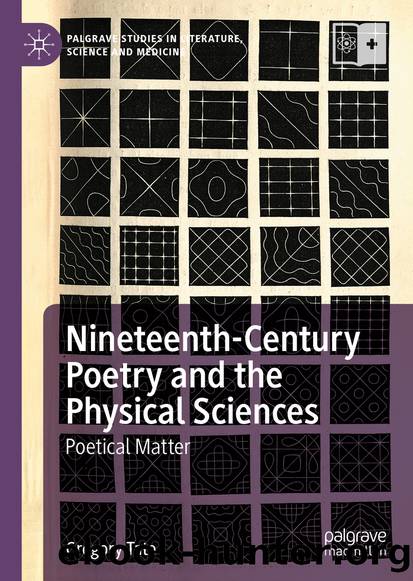Nineteenth-Century Poetry and the Physical Sciences by Gregory Tate

Author:Gregory Tate
Language: eng
Format: epub
ISBN: 9783030314415
Publisher: Springer International Publishing
Nineteenth-century physics, Bridges claims, mistakes words for things by reifying a theoretical model of the universe. Its speculations, which illegitimately transcend the boundaries of empirical knowledge, are more characteristic of outmoded metaphysical systems than of positivism. His reference to the scientific imagination suggests that he may be thinking specifically here of Tyndall’s “ultra-experiential” theorising, and his argument is comparable to that of the critics who disparaged Tyndall’s reliance on speculative rhetoric. But Bridges’s scepticism towards mathematical explanations indicates that he also disapproves of the theoretical and statistical physics of Maxwell and Thomson; physical science in general is compromised by its promotion of a materialism that is founded not on positive evidence but on linguistic and mathematical abstraction.
Writing in Fraser’s Magazine a few months later, the poet William Allingham cites Bridges’s criticisms of the atomic theory in support of his sustained polemical assault on the “Modern Prophets” of physical science. The “scientific doctrine now in vogue,” Allingham observes, reduces the universe to “Atoms and Ether; and we are told a great deal of the size and movements of the invisible Atoms, and of the qualities of the mysterious Ether.” He then paraphrases (or misquotes) Bridges’s verdict that this doctrine “is mere speculation.”87 Allingham’s article was one of several printed in Fraser’s in the 1860s and 1870s that attacked the speculative pretensions of scientific language. In 1873, for example, John Stuart Blackie lamented the reliance of “some of our most prominent modern scientific speculators” on “certain fashionable technical names, such as law, force, sequence, development, evolution, natural selection, which at bottom express only methods of operation, but are given forth with an air as if they contained some idea of an ultimate cause.”88 And after the Belfast address, in 1875, the Conservative MP William Forsyth censured Tyndall for having “used language which it is difficult by any charitable construction to exculpate from” the “charge of teaching mere materialism in its most uncompromising form.” “What I complain of,” Forsyth writes in his article “On the Limits of Science,” “is that scientific men should quit the domain of science, and substitute conjecture for proof, and imagination for reality.”89 He criticises Tyndall’s language both for being too reductive and for not being reductive enough: the uncompromising materialism of the address is founded not on facts but on conjectural and scientifically vacuous words. And, like John Tulloch in Blackwood’s, Forsyth contrasts the reckless imagination of Tyndall’s rhetoric with the respectable and devout eloquence of poetry, asserting that
if Science steps out of her lines and seeks to assail the citadel of religion, she never can by any legitimate logic or experimental test disprove what the poet has said:All are but parts of one stupendous whole
Download
This site does not store any files on its server. We only index and link to content provided by other sites. Please contact the content providers to delete copyright contents if any and email us, we'll remove relevant links or contents immediately.
Still Me by Jojo Moyes(11266)
On the Yard (New York Review Books Classics) by Braly Malcolm(5525)
A Year in the Merde by Stephen Clarke(5430)
Eleanor Oliphant Is Completely Fine by Gail Honeyman(5282)
The Bookshop by Penelope Fitzgerald(3853)
How Music Works by David Byrne(3270)
Surprise Me by Kinsella Sophie(3113)
Pharaoh by Wilbur Smith(2993)
Why I Write by George Orwell(2953)
A Column of Fire by Ken Follett(2612)
Churchill by Paul Johnson(2587)
The Beach by Alex Garland(2560)
The Songlines by Bruce Chatwin(2555)
Aubrey–Maturin 02 - [1803-04] - Post Captain by Patrick O'Brian(2306)
Heartless by Mary Balogh(2259)
Elizabeth by Philippa Jones(2205)
Hitler by Ian Kershaw(2198)
Life of Elizabeth I by Alison Weir(2086)
Harry Potter and the Cursed Child by J. K. Rowling & John Tiffany & Jack Thorne(2063)
